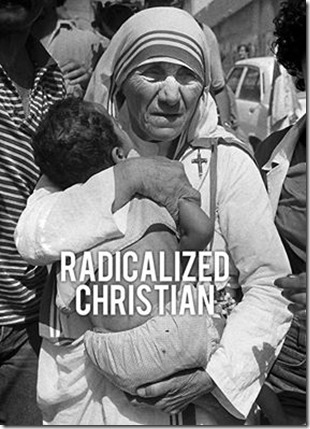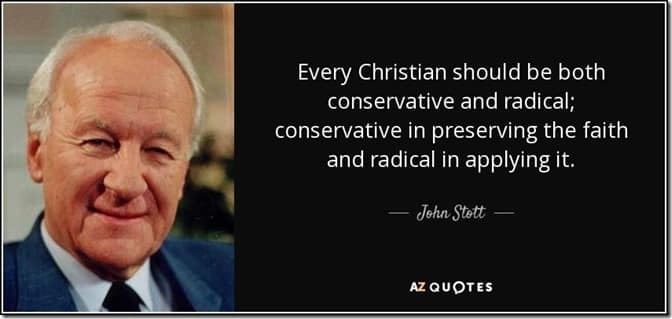I have posted three images above: Catholic, Orthodox, and Protestant. All of them speak to the idea of radical Christianity. And, all of them say pretty much the same thing. Two of the quotes are from saints, one a Catholic saint and one an Orthodox saint. The third one is a Protestant who is as highly regarded as almost any Protestant theologian there is. Yet, there is an intriguing sameness as to how they approach the idea of being a Christian. There is a commonality there that does speak to me of God having left a message clear enough for people to understand. Two are quotes; one is a simple photograph with a meme. All three make the same statement as to what it is to be a Christian.
The meme shows a photograph of Mother Theresa holding a very young child with the words, “Radicalized Christian,” imprinted on the photograph. The Eastern Orthodox quote is from St. Symeon the New Theologian who says, “Visit the sick, console the distressed, and do not make your longing for prayer a pretext for turning away from anyone who asks for your help. Love is greater than prayer.” The Protestant quote is from The Rev. John Stott who says, “Every Christian should be both conservative and radical; conservative in preserving the faith and radical in applying it.”
The sameness to the three could be summarized by that saying, “if it looks like a duck and it quacks like a duck, it is a duck.” A radical Christian is one whose behavior matches that of Christ, that of the teachings of both the Old Testament and the New Testament. In John 13, Christ says, “By this everyone will know that you are my disciples, if you love one another.” But, more specifically, all three people point to the work with the poor, the distressed, the abandoned as the mark of true Christianity. The person who can ignore the needy is not to be thought of as one who knows God. This does not mean that one has to personally go to a homeless shelter or to a prison every week. But, it does mean that a deep concern for others is one of the key marks of being a Christian. No love; no Christianity. The Parable of the Good Samaritan spoke to a radical approach as to who is my neighbor.
Orthodox Pentecost is this Sunday. Tomorrow is the day when we commemorate that the Holy Spirit was given so that we might be able to reach the whole world, not merely in the preaching of the Gospel but also in the doing of the Gospel. We have been sent to a needy world, one that has both spiritual and physical needs. We are to minister to the whole person: body, soul, and spirit. All three point to ministering to the needy because that is the easiest part of the good news to forget. If you start preaching to stadiums full of people, you can easily neglect the needy. “Visit the sick … and do not make your longing for prayer a pretext for turning away from anyone who asks for your help,” says Saint Symeon the New Theologian.
This Sunday we celebrate the day when we are called to go out to the whole world to minister to the whole person. Let us dedicate ourselves to minister to that whole person this Sunday. Word and action go together to make a full gospel. That is our calling.






“There is an ancient Church tradition, which teaches that when St. John the Apostle was released from his captivity on the island of Patmos, this evidently now extremely old man lived in the city of Ephesus. Because he was so frail, he had to be carried to the church in the arms of his disciples in order to attend services. At each of these sacred gatherings this Apostle whom Jesus loved, who was previously accustomed to lengthy preaching, eventually began to say no more to these early Christians than to repeat the phrase, “Little children, love one another!”
After a time, many of the faithful, wearied at always hearing the exact same words spoken over and over again, asked, “Master, why do you always say this?”
“Because it is the Lord’s command,” was his reply. “And if this alone can be accomplished, it is enough!”
Let each of us take this simple lesson to heart and be ever mindful of the precious fact that the Holy Gospel of Christ is indeed God’s Own personal message both to the clergy and the laity. Be resolved, therefore, to follow the one, simple commandment laid down by our Lord, Himself: to indeed “Love one another as Jesus loves us!”
Notes from Fr. John
Oswald Chambers spoke this way, as does Oz Guinness.